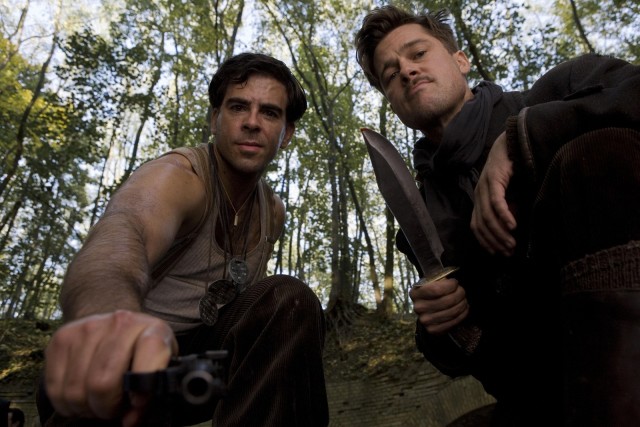Dirty Basterds

Lt. Aldo Raine (Brad Pitt) and Sgt. Donny Donowitz (Eli Roth) are just two of Tarantino’s many Basterds. (photo courtesy Francois Duhamel/TWC 2009)
If Quentin Tarantino can show you a Nazi being scalped, he will show you a Nazi being scalped. If you fret over the sight of Nazi-scalping—or harbor moral questions about whether or not it’s okay to scalp Nazis as entertainment simply because they’re Nazis—then Inglourious Basterds, director Tarantino’s sometimes smug, often enthralling WWII opus (opening at the Guild 45th and other local cinemas) should remain off your to-do list.
As for the rest of you: Can you write me a nice, consoling note after watching the film? I’m still feeling cheap for enjoying any of it. I’m not comfortable getting a rush from a "fairy tale" (I’m quoting the press kit now) that uses Nazi-extermination as too-easy fodder. But somehow my brain forgot that fact during most of the film. I didn’t start to squirm until about three-quarters of the way through when I realized that Tarantino’s would-be grand gag wasn’t that funny.
In an homage to Italian spaghetti western filmmaker Sergio Leone (Once Upon a Time in the West), Basterds opens in portentous stillness, sheets blowing in the breeze at a quiet country cabin, with the words "Once upon a time…in Nazi-occupied France" on the screen. Far in the distance, we see trouble on the horizon: Nazi Colonel Hans Landa (Christoph Waltz), aka The Hunter, is coming to the house to ask after some missing Jews. The result of that deadly inquiry leaves a young girl escaping to Paris, where she’ll soon be in charge of a cinema.
Shoshanna Dreyfus (Mélanie Laurent) and her moviehouse later become entangled again with Landa, as well as with an elite Jewish-American Army unit (the titular "basterds") of Nazi hunters under the command of Lt. Aldo Raine (Brad Pitt). Besides beating and scalping—both played big and broad, Kill Bill-style—the Basterds plot to finish off the Third Reich with the help of a German movie star (Diane Kruger).
What results is an epic mish-mash of stylistic genres that finds writer/director Tarantino in undeniably prime postmodern form. Shoshanna’s story remains mostly Leone-operatic in tone; Raine and the Basterds behave as if they’ve busted their way into this film from some ballsy 1970s exploitation thriller (Til Schweiger, as the formidable, don’t-fuck-with-him Hugo Stiglitz, is introduced via an amusing flashback montage narrated by Samuel L. Jackson). There isn’t anything or anyone from the last century of pop culture that isn’t up for grabs, including a funny throwaway line at the expense of bland, mid-century American heartthrob Van Johnson and an appearance on the soundtrack of David Bowie’s theme song to the 1982 remake of Cat People.
Though Laurent has the cool of a Godard heroine and Waltz’s toothy villainy is the best thing going—he coils Tarantino’s sometimes tiresome irony back around on itself and turns The Hunter into a terrifyingly patient snake—I suspect everyone else is going to be talking about Pitt. Plying a cornpone-butch Southern accent that makes "Nazis" rhyme with "Ratzies," he’s having what Dorothy Parker used to call "ham’s holiday". Since that’s better than Brad Pitt thinking he’s acting I guess you have to line up behind it to cheer him on.
Tarantino, meanwhile, still knows how to make a film that gives off the prickly sensation that he can’t believe he got his hands on a camera, a terrific cast, and a big budget. Basterds boasts a vicious, palpable excitement about…being a movie. Tarantino believes in his heart that movie-going is the pinnacle of adult recreation. I don’t disagree with him. I’m on the fence, however, about that kind of director hooting it up with a vengeful war fantasy at this point in history.
Tarantino plays with our need to use movies as emotional outlets—not always adroitly and certainly not subtly. You haven’t seen Nazis this ridiculous since Hogan’s Heroes. Hitler (Martin Wuttke) and Herman Goebbels (Sylvester Groth) show up here for the premiere of Goebbels’s ludicrous propaganda action film-within-a-film that, I hope, Tarantino knows is just as cartoony as Basterds. But because Tarantino’s film is an over-the-top fantasy about a universally reviled enemy you never think, "I should feel as ashamed at myself for enjoying this recklessly entertaining movie as the Nazis should feel for enjoying that one." Or, rather, you may indeed feel ashamed but Tarantino backs away from any control of the notion as if, hey, he never told you not to have a good time. He has his cake and he wants you to eat it, too.
But, oh, when he’s at the point just before his full-tilt goofing he’s superb. A great number of the scenes here are among the best Tarantino has ever done. That opening sequence in the French cabin wouldn’t shame Hitchcock and includes one of the most exquisitely excruciating reveals I’ve enjoyed in a while. Tarantino makes you wait and wait for it…and then wait again while Landa drinks a glass of milk with a very nervous villager. Waltz has all the time in the world to smack his lips around dialogue that’s punchy in all the right ways—Tarantino toys with the typical movie convention of characters switching from speaking in subtitled French to English, scores a laugh off it, then gives it a fearsome payoff that proves it wasn’t just a joke.
I didn’t walk out at the end of the film with the same thought. But maybe Basterds is the joke we need.
